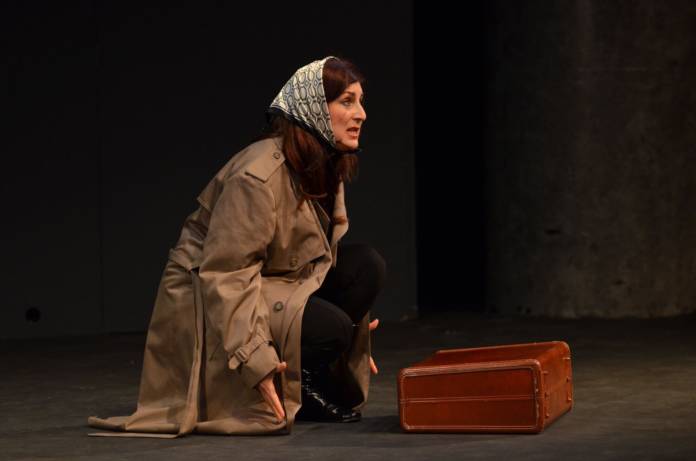Even before the play begins, a red suitcase is in full view, slightly stage right, on an otherwise empty set.
During the course of the play, the eponymous suitcase will take on many roles—a television set on which Iranians living abroad learn of the revolution in their country, a valise carrying scarves and a long coat necessary for a young teenager’s arrival in the Islamic Republic of Iran, a container holding a stash of black market Madonna and George Michael Betamax tapes, and a chair in a stark interrogation room of the Ayatollah’s Revolutionary Guards.
Like the suitcase, versatile actor Ana Bayat (Mimi) plays multiple roles in her solo show, Mimi’s Suitcase, performed at Theater of Yugen’s NOHSpace from January 23-25. Bayat portrays 27 characters, men and women of all ages, ranging from a love struck teen anticipating her first date at a skating rink in Barcelona, to a judgmental middle-aged, chain-smoking aunt, to a vicious police officer barking orders at young partygoers whose main offense is dancing.
But Bayat is most engaging as the teenage Mimi who, after a happy childhood in Spain, is forced by financial pressures to return to her homeland of Iran with her family. Post-revolutionary Iran, with its strict morality code enforced by the Bureau of Guidance and Conduct, is a dreadful jolt to Mimi, who loves Flashdance and Michael Jackson and resents the suppression of women’s freedom that doesn’t even allow her to feel the breeze in her hair.
Through the eyes of the young Mimi, Bayat, who created and wrote the autobiographical play, explores universal themes of family, growing up, friendship, displacement, and identity.
As she observes her different surroundings, some of the contrasts Mimi identifies are quite thought-provoking. Disgusted by the arrogant religious policemen who loll on Tehran street corners harassing young women, Mimi recalls the idle young Spaniards who harassed young women in Barcelona. The difference? The men in Tehran hold state power, and can arrest women on a whim and imprison them in the dreaded Komite for defying the strict morality code.

Bayat, whose training in theater began in a mind-boggling Stanislavski method-acting school in Iran, moves easily from English to Farsi to Spanish and French. Even her English has a wide range: she flawlessly takes on the nuances of a struggling beginner in an ESL class, a snooty British Consulate officer, and a brash, nasal Cockney in a London hair salon. The audience is guided through the Farsi with supertitles.
Though each scene is absorbing, and played with wit and energy, Mimi’s Suitcase does not reach a satisfying dramatic arc. One outsize character, Mimi’s father, appears infrequently yet plays a crucial role at the end, and the basis for that role does not seem earned. Like a delicious array of tapas, we are treated to moments savory, picante and sweet, yet somehow the main course is missing. Though we are entertained and moved at each stage along Mimi’s journey, it is unclear as to where she—physically or emotionally—ends up.
The San Francisco production of Mimi’s Suitcase was directed by Elyse Singer. The show premiered at the 2015 United Solo Festival in New York and won both the Audience Choice Award for Best Play at Kulturverein Boje in Germany and the Pick of the Fringe award at the Edinburgh Fringe Festival.






